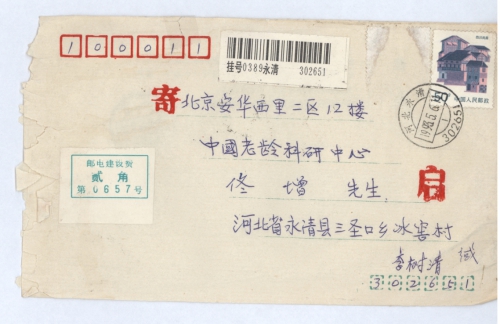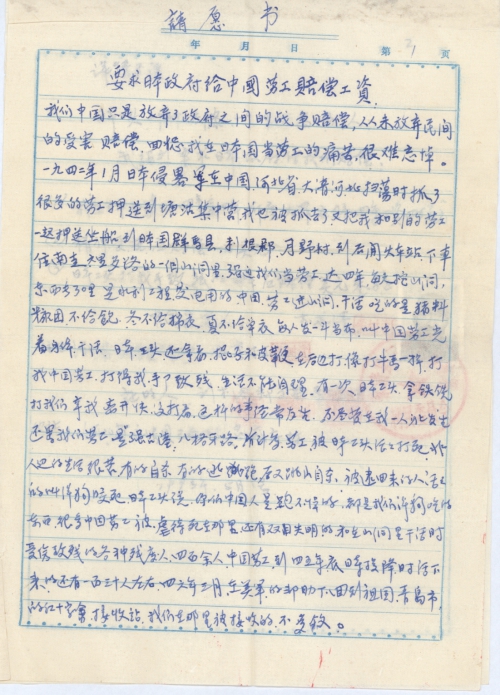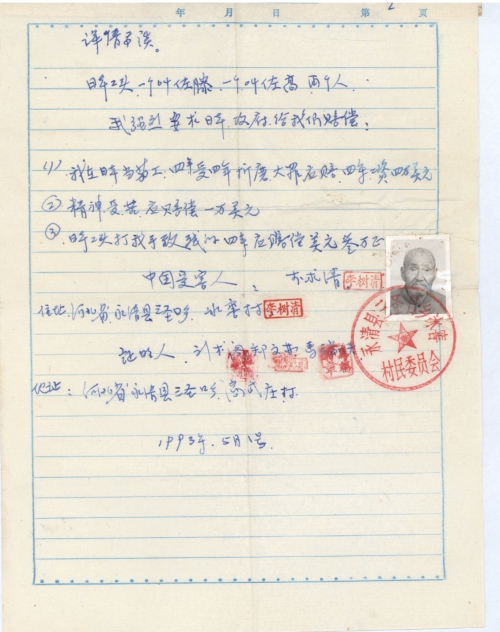Date of letter:1993-05-01
Address of author:Yongqing County, Langfang City, Hebei Province
Date of event:1942-01
Location of event:North Daqing River, Hebei Province
Name of author:Li Shuqing
Name(s) of victim(s):Li Shuqing
Type of atrocity:Slave Laborers(SL)
Other details:In 1942, the Japanese conscripted many Slave Laborerss in Daqing River area and I was one of them. The soldiers escorted us to boat bound for Japan. We were forced to work really hard for 4 years, digging caves and feeding on hogwash every day. As no proper clothes were provided either for winter or for summer, the Chinese Slave Laborerss had to work naked, besides being tortured by sticks or whips and living a beastlike life. Some were disabled, some could not take care of themselves, and those sick were never treated. Some people couldn’t bear the abuse anymore and committed suicide; some ran away, however, once they got caught alive they would be gnawed to death by hounds. I claim compensation from the Japanese government for all that I suffered in those four years.
Petition Demanding the Japanese Government to Compensate Lost Wages to Chinese Laborers
China gave up government-to-government war compensation demands after the Second World War, but the rights of Chinese civilians seeking compensation from the Japanese government were never relinquished. The following is my unforgettable painful memory as a forced laborer in Japan.
In January 1942, many people, including myself, were captured by the invading Japanese army during a raid in northern Daqinghe, Hebei and sent to the Tanggu Concentration Camp. I was later shipped to the railway station of Nomura, Ligon, Gunma, Japan. I was forced into labor for 4 years in a ravine 6 miles south of the railway station. I dug cave every day. The cave was over 15 km long from east to west and used for hydraulic power generation. Every day we did heavy work but ate pig feed and bran buns; we were always hungry. We did not have warm clothes in winter nor thin clothes in summer. We were only given a crotch cloth every day to work naked. The Japanese foremen regularly beat the Chinese laborers with sticks and whips like they did to cattle and horses and called us morons. I was badly beaten that caused my hand disability, depriving me of the ability to live independently. Once, there was a Japanese foreman who used a spade to beat us, but luckily, I escaped fast and he missed me. Things like this happened often and to other laborers, too. We were called names. Many Chinese laborers were beaten to death by the Japanese foremen. The life was inhuman and hard. Some laborers killed themselves, some escaped but then killed themselves by jumping off a mountain, and some escapees were arrested back and mauled alive by Japanese dogs. The Japanese foremen said, “You Chinese people cannot run away. You are just food for Japanese dogs.” Some Chinese laborers died of injuries from working and some were blinded or disabled. When Japan surrendered in late 1945, only about 130 out of over 400 Chinese laborers were still alive. We returned to our motherland in March 1946 with the help of American army and were received by the Red Cross of Qingdao, China.
We may talk about the details in person.
The two Japanese foremen were called surnamed SATO and SATAKA .
I strongly demand retribution from the Japanese government.
1.I worked as a laborer for 4 years in Japan and suffered 4 years, so I should be compensated a 4-year wage of 40,000 USD.
2.I should be compensated 10,000 USD for my mental suffering.
3. I should be compensated 30,000 USD for my hand disability due to the beating by the Japanese foremen.
Chinese victim: Li Shuqing (Personal seal)
Li Shuqing (Personal seal)
Address: Bingjiao, Sanshengkou, Yongqing, Hebei
Villagers’ Committee of Bingjiao, Sanshengkou, Yongqing
(Villagers’ Committee seal)
Witness: Liu Shuge (Personal seal), Zheng Wenlin (Personal seal), Ma Ruifu (Personal seal)
Address: Shangwuzhuang, Sanshengkou, Yongqing, Hebei
May 1, 1993

















